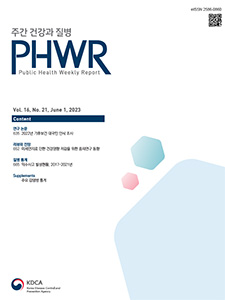Current Issue
Vol.16 No.21, June 01, 2023
-
Original Articles 2023-06-01
 2
2
 1136
1136
 367
367
2022 National Public Awareness Survey on Health Impacts of Climate Change
Joo-Yeon Hwang, JongHee Kim, Ho-Jang Kwon, Seoung-Sik Hwang, Hyoeun Kim, Seongwoo Park, Youngju Lee, Younjhin Ahn
Public Health Weekly Report 2023; 16(21): 635-651 https://doi.org/10.56786/PHWR.2023.16.21.1 Abstract
AbstractThe Korea Disease Control and Prevention Agency operates a Climate Health Impact Assessment every five years and publishes the results to minimize the damage to public health caused by climate change. An online structured survey was administered in the first study which investigated public awareness regarding the impact of climate change on public health. There was a high level of interest concerning about climate change (87.4%). However, awareness of the health risks caused by climate change (63.2%) and the 1st Climate Health Impact Assessment (9.1%) was low, and differences in awareness by sex and age were confirmed. In addition, we confirmed the public demand for climate health information, areas of interest, and preferred media. However, we found that the related information was inadequate (30.3%). Further, we plan to develop more actionable and sustainable evidence-based contents through in-depth comparative research. We must pay more attention to raising public awareness and improving health literacy on climate change.
-
Review & Perspective 2023-06-01
 0
0
 2361
2361
 273
273
Trends in Intervention Research for Reducing Health Effects of Particulate Matter
Eunjin Kwon, Hwan-Cheol Kim, Young Youl Kim
Public Health Weekly Report 2023; 16(21): 652-664 https://doi.org/10.56786/PHWR.2023.16.21.2AbstractAir pollution, especially particulate matter ( PM), is one of the major public health risk factors. More than 91% of the global population lives in areas where air pollution exceeds the World Health Organization (WHO) recommended limits. WHO estimated that air pollution is responsible for approximately 4.2 million deaths every year. PM has serious effects on health outcomes (especially in respiratory and cardiovascular diseases and all-cause morbidity). However, there are few intervention studies on the reduction of PM-exposure related health effects. Currently, air purifiers, masks, behavior and other interventions, diet and medications are the recommended interventions for reducing the effect of PM on health; however, scientific evidence for the effects of these interventions are lacking. Here, we review the intervention studies on PM and aim to identify the recent research trends. Using air purifiers significantly lowered the concentration of PM, resulting in a decrease in inflammation and blood pressure. Similarly, wearing a mask showed changes in lung function and blood pressure; however, there was no remarkable changes in the effects on the cardiovascular system. Therefore, intervention studies are limited and more research is needed.
-
QuickStats 2023-06-01
 1
1
 1182
1182
 310
310
Occurrence of Drowning Accidents
Public Health Weekly Report 2023; 16(21): 665-668 https://doi.org/10.56786/PHWR.2023.16.21.3

pp. 287~325
Most Keyword
?
What is Most Keyword?
- It is the most frequently used keyword in articles in this journal for the past two years.
Most Read
-
Management of Technology Development Efforts to Enhance the Healthcare Establishment’s Infection Response Capabilities
Misuk An, Hyeyoung Lee, Se-Jin Jeong, Hojin Lee, Sunkyung Baek
Public Health Weekly Report 2026;19: 1-12 https://doi.org/10.56786/PHWR.2026.19.1.1 -
Status and Future Tasks of the Regional Infectious Disease Specialized Hospital Establishment Project for Responding to Large-scale Emerging Infectious Disease Crises
Jeong-won Yeom, Hae-won Cho, Ju-hong Kim, Jong-hee Choi
Public Health Weekly Report 2026;19: 13-28 https://doi.org/10.56786/PHWR.2026.19.1.2
Editorial Office
+82-43-719-7569





 Full Text
Full Text Cite
Cite


